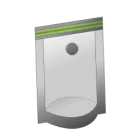Eco-friendly packaging for food and other items that focus on sustainability and best practices
Traditional packaging materials, like plastic and metallic packaging, contribute significantly to soil pollution and are responsible for a significant portion of waste in landfills and oceans, that does not degrade easily. As such, consumer demand for eco-friendly packaging is rising, making brands adopt sustainable practices, including eco-friendly packaging for food. Being one of the top eco-friendly packaging suppliers, Entrepouch makes use of biodegradable, compostable, and recyclable materials in its packaging supplies for industries and retailers, that offer a pathway to reducing the persistent pollution threat, making a sustainable impact on the environment.
Due to increased focus on reducing, reusing, and recycling, sustainable packaging has become more than just a trend in the Philippines and the world at large; it is a reflection of corporate responsibility and a way to build a positive image in a competitive market. Using eco-friendly packaging for food is crucial for a sustainable future, as it helps reduce pollution, conserves natural resources, and aligns with consumer expectations for responsible business practices. Eco-friendly packaging suppliers not only reduce their environmental impact but also enhance their reputation and customer loyalty.
Here are some of the popular types of eco-friendly packaging for food and other products provided by Entrepouch eco-friendly packaging suppliers:
• Recyclable packaging is made of products like PET, Kraft Paper, and cardboard, which are recyclable and reduce the need for virgin resources.
• Biodegradable materials that are compostable and decompose into organic material and help enrich the soil.
• Reusable packaging made of silicone products, metal tins, or glass that reduce waste as these packaging materials can be used repeatedly.
• Minimalist and zero-waste packaging that makes use of plant-based adhesives that reduce waste and energy consumption.
• Paper foam packaging, which is biodegradable, and offers excellent cushioning properties. It is commonly used for packaging electronic and fragile items.
• Our edible packaging solutions are made with edible options like seaweed-based wrappers or edible films that can be eaten or decomposed quickly.
• Recycled materials that reduce the need for new raw materials and support the circular economy.
Minimizing environmental impact
As the food industry is one of the largest contributors to packaging waste, sustainable solutions are essential for reducing landfill contributions, conserving resources, and decreasing pollution. Conventional food packaging, such as plastic and aluminum, relies heavily on nonrenewable resources like petroleum and requires significant energy to produce. Eco-friendly packaging for food helps minimize environmental impact while maintaining the safety, freshness, and quality of the food. By shifting to eco-friendly packaging for food, the food industry can help conserve valuable resources and lower the overall carbon footprint associated with packaging, contributing to a more sustainable supply chain.
Food packaging must meet strict standards to keep products safe, fresh, and uncontaminated. As the leading eco-packaging supplier or the food industry, Entrepouch balances sustainability with best practices that make our packaging the top choice for food products. Compostable packaging even provides nutrients back to the soil when disposed of in composting facilities, making it ideal for short-lifespan items like food. The packaging solutions help reduce landfill waste, and offer a renewable alternative to plastic, and support a more sustainable, circular economy, where materials can be replenished without depleting the Earth’s natural reserves.









